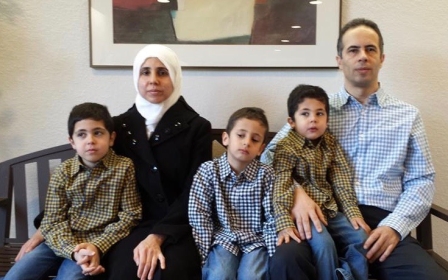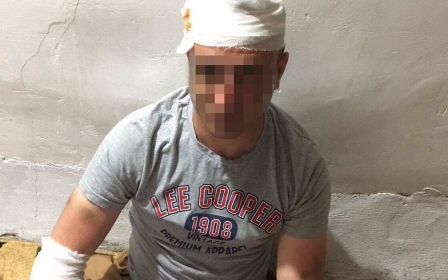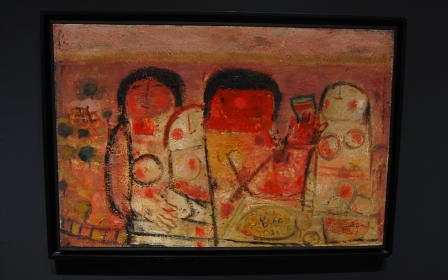A token of appreciation: Syrian parents in Canada name infant after Trudeau
TORONTO, Canada – Afraa Hajj Hammoud describes it as a small token of appreciation.
But the young mother of three knows that her newborn son will have questions when he’s older about why his parents named him after the Canadian prime minister.
“I’m going to tell him [the whole] story: that Justin Trudeau the prime minister helped us, and he’s a really nice man,” Hammoud told Middle East Eye last week, about why she and her husband, Mohammed Bilal, named their son Justin-Trudeau.
Born on 4 May, the baby’s full name is Justin-Trudeau Adam Bilal.
He’s one of a handful of infants who have been named after the Canadian politician, after being born in Canada to recently resettled Syrian refugee parents.
Hammoud conceded that her relatives back in Syria “were a bit shocked” by the name choice. Her older children, four-year-old Naya, and three-year-old Nael, have more traditional, Arabic names.
“It’s a Canadian name, a little bit difficult for them,” said Hammoud, who has been learning English since her family settled in Calgary, in western Canada.
The family left their home in Damascus due to the ongoing war in Syria, and lived as refugees in Lebanon for a little over three-and-a-half years, before landing in Canada on 5 February 2016.
Starting a new life so far from Syria was difficult, especially in the beginning, Hammoud explained. “When we came, everything was different. There were big changes, the language, the weather,” she said.
But with a strong network of Syrian and Canadian friends in Calgary there to help, things are improving, and Hammoud said all she wants is for her children to grow up in a place they could pursue their dreams.
“We hope [for] them to [have] a free life, and a happy life. We hope [they can] study whatever they like,” she said.
40,000 Syrians in Canada
The family is among more than 40,000 Syrians who have been resettled across Canada since late 2015. Most came to Canada in the first half of 2016.
Canada admitted 46,700 refugees into the country last year, the largest number since 1978. That figure counts both government- and privately-sponsored refugees, the vast majority (33,266) of which were from Syria.
Canada has employed a private sponsorship system since the 1970s through which churches, synagogues, mosques and other groups – known as private sponsorship agreement holders – can support newcomers in their first year in Canada.
Groups of five Canadian citizens and permanent residents can also band together to act as private sponsors (a “Group of Five”), so long as they provide financial support to a refugee family for 12 months.
Many Canadians were galvanised by the shocking image of Syrian toddler Alan Kurdi, who washed up dead on a Turkish beach in September 2015 after his family attempted to cross the Mediterranean towards Europe.
“A highlight of the past year has been the close collaboration of governments at all levels, settlement sector, and voluntary and business sectors,” a group of organisations serving newcomers said in a statement last December.
“We hope we can build on that collaboration for the future, so that we offer all newcomers the best possible chance of quick and full integration.”
Delays and backlog
This year, Canada plans to bring 16,000 privately sponsored refugees and 25,000 government-sponsored refugees into the country.
But the federal government also quietly put a cap on Groups of Five and community sponsorship for Syrian and Iraqi refugees this year. The 1,000-application limit was reached by 25 January.
'We inherited those backlogs from the previous government, which allowed those backlogs to balloon irresponsibly'
- Ahmed Hussen, immigration, refugees and citizenship minister
Ottawa said its decision aims to unclog the existing backlog by 2019, and reduce wait times on applications to less than 12 months.
“As of late November 2016, there were 45,000 persons for whom applications for private sponsorship were in process,” according to the Canadian Council for Refugees.
Of that figure, which includes applications from all over the world, 6,400 applications have been pending for more than three years.
About 97 percent of Canadian sponsorship-agreement holders said they were concerned by the long wait times, according to a recent report from Citizens for Public Justice, a Christian think tank.
While the government expedited Syrian refugee arrivals, one group mentioned that some private sponsors “have been waiting for about six years to receive the families they are sponsoring,” the group said.
Most of the delays happen at processing centres overseas, the report stated, and they can be attributed to a lack of resources, and logistical challenges in conflict zones or refugee camps where the refugees are being vetted and processed.
“We inherited those backlogs from the previous government, which allowed those backlogs to balloon irresponsibly,” Canadian Immigration, Refugees and Citizenship Minister Ahmed Hussen told The Catholic Register last month.
Hussen said Ottawa’s plans for refugee resettlement in 2017 are “historic”.
Calls for more action
The resettlement process once Syrian refugees arrive in Canada has also not been easy.
Many refugees entering their 13th month in Canada - the point at which monthly government funding ends - have struggled to support themselves independently, without stable jobs or a steady source of income.
Grassroots networks of support have formed across Canada – including several social media groups where users share information and best practices – and projects to help refugees find work and learn English, while integrating into their local communities, have been launched.
Earlier this year, a group of professors, students, and other experts from the University of Windsor penned an open letter calling on the government to do more to help in the resettlement process.
They want Ottawa to lift the cap on Syrian and Iraqi refugee resettlement, and immediately increase the total number of resettlement spaces.
“Canada is in a position to offer many more places, to set a global example for other states to follow, and to send a message that we are truly a country open to refugees,” the letter read.
“Prime Minister Trudeau, we remind you of your 2015 election promises to welcome refugees and celebrate the multicultural richness of this country. We appreciate your recent words praising our diversity and inclusiveness as a country but, without action, these words ring hollow.”
New MEE newsletter: Jerusalem Dispatch
Sign up to get the latest insights and analysis on Israel-Palestine, alongside Turkey Unpacked and other MEE newsletters
Middle East Eye delivers independent and unrivalled coverage and analysis of the Middle East, North Africa and beyond. To learn more about republishing this content and the associated fees, please fill out this form. More about MEE can be found here.




